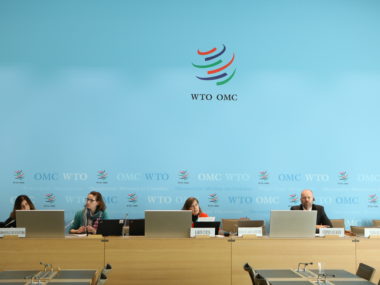By Cullen Hendrix for Denver Dialogues
The Syrian Civil War (2011-) has so far claimed over 400,000 lives and pushed nearly six million refugees and internally displaced persons from their homes. It is the defining humanitarian crisis of our time, having drawn in the United States, Russia, and Turkey, among others. The massive refugee crisis created by the conflict strains both neighboring countries and relations within the European Union.
Syria has become, like Darfur before it, the go-to example of a conflict fueled by climate change. Documentaries like Thomas Friedman’s Climate Wars, The Age of Consequences, and VICE News’ Assad’s Syria and the Costs of Climate Change have all made strong claims for security impacts of climate change building off of the Syrian case. President Obama said climate change-related drought “helped fuel the early unrest in Syria, which descended into civil war,” while Secretary Kerry noted “it’s not a coincidence that immediately prior to the civil war in Syria, the country experienced its worst drought on record.”
This interpretation has come under fire recently. The resulting exchange is a teachable moment – both about being nuanced about the relative causal weight of various factors, but also about how this discourse is consumed by non-specialists.
The dominant narrative, in brief, goes as follows: climate change contributes to a historic drought (2007-2010), which leads to crop and livestock failure, which leads to rural hardship and migration to urban centers, which leads to dissatisfaction with the government and employment prospects, which leads to protest and violent repression, which leads to dissidents taking up arms. This narrative was distilled brilliantly in cartoon form in May 2014, largely informed by a policy brief released by the Center for Climate & Security.[1] That same year, Peter Gleick – a prominent voice on the security implications of water scarcity – published a piece coming to a similar conclusion. In 2015, Colin Kelley and a team of researchers published a more data-driven exercise that augmented existing arguments and brought to bear climate data, demonstrating the Syrian drought was both the worst in instrumental record and made three times more likely by anthropogenic climate change.
Yet also like Darfur before it, the climate-change-contributing-to-conflict narrative is now being hotly contested. A just-published critique by Jan Selby and co-authors takes aim at the links between climate change and the Syrian Civil War, arguing 1) there is no clear and reliable evidence that anthropogenic climate change was a factor in Syria’s pre-civil war drought, 2) this drought did not cause truly mass migration, and 3) there is no solid evidence linking in-migration with the grievances that brought Syrians into the streets in 2011. Kelley et al. and Gleick responded immediately; Selby et al. then responded to their responses. Caitlin Werrell and Frank Femia from the Center for Climate & Security responded soon after.
I leave it to the reader to assess the evidence presented by both sides. If you’re interested in my take on the debate, you can find a longish response here. If you are interested in my short take, it’s pretty much the following: Do I believe climate change and climate shocks can place strain on societies in ways that increase the likelihood of conflict? Yes, most definitely – there’s a relatively large literature on this now, though the findings are still somewhat muddled and context- and scale-dependent: climatic conditions affect different types of conflict in different ways. Do I believe that environmental conditions, i.e., the Syrian drought, contributed to the conflict in Syria? Probably, though the evidence is not entirely clear cut. Do I believe climate change caused the Syrian conflict? That’s an incredibly difficult claim to substantiate for at least two reasons.
The first is that arguing any particular conflict was “caused” by climate change is exceedingly difficult. Multiple motivations are always present among participants, and these motivations are both stated and unstated. Also, contextual factors, like dependence on agriculture for livelihoods, patterns of exclusionary ethnic rule, and low levels of economic development affect whether a given climate “shock” results in violence.
The second is the slipperiness of causal language, especially when these accounts are picked up and rebroadcast by the media and policymakers. One of the big axes being ground in the above debate is what exactly does it mean for climate change or environmental conditions to have “contributed” to the Syrian conflict. Does it mean that absent climatic stresses, the conflict would not have occurred? Does it mean that its impact was decisive in a context already among most- (or at least more-) likely cases for civil war, i.e., the straw that broke the camel’s back?
Most research on climatic conditions and conflict finds climate shocks raise the probability of a large-scale event (like conflict onset) occurring relative to some baseline, or increases the frequency with which smaller-scale events (protests, individual battles or skirmishes, cattle raids) occur. That is, climate shocks are probabilistically causal in the sense that they make something more likely. They are not deterministically causal in the sense that they are wholly responsible for the outcome. These relationships emerge from the study of hundreds if not thousands of cases using quantitative methods, including meta-analyses. That is, the evidence is stronger in the aggregate than as evident in any individual case. This sets up the possibility of an ecological inference problem: attributes of individual cases are inferred from the attributes of the group to which individual cases belong.
Let me reason by example. Does smoking make lung cancer more likely? Of course. This relationship has been confirmed over and over and over (and over). My maternal grandfather died of lung cancer. He smoked until the age of 21. Was my grandfather’s lung cancer caused by smoking? Probably not, or at least not in the main. He worked in a lumber treatment facility where he was exposed to toxic chemicals for most of his adult life. That is, other factors were more important in explaining the outcome, even if the “causal” factor was present and may have been a contributing factor.
In the Syrian case, we might look to long-standing issues like authoritarian rule, human rights abuses, exclusionary patronage networks built around religious identity, proximate “sparks” like surging food and fuel prices, weak safety nets and employment prospects, and the demonstration effect of Arab Spring uprisings in neighboring countries. Environmental conditions may have exacerbated some of these problems (food prices in particular), but they did not create them and were not primarily responsible for them.
Why does this matter? While researchers are good at caveating their arguments, those caveated arguments don’t often translate to media and policy audiences. These audiences are keen to link abstract, probabilistic mechanisms to particular cases. For this reason, scholars face implicit encouragement to frame their results in terms of cases that seem to fit the causal processes they seek to model. When this evidence is marshalled to explain any particular event, however, it often takes on the air of a necessary condition – if but for the climate shock, the event would not have occurred. This claim is almost always impossible to substantiate and invites significant criticism – to wit, the whole exchange above.
Ultimately, I land pretty close to Werrell and Femia: the conversation over climate change’s role in Syria – and other conflicts – is a conversation worth continuing. But as researchers, we must continue this conversation cognizant of how it is being interpreted by non-specialists. If not, we risk public overstatement of the problem and getting cases “wrong.” Doing so would undermine the already strong case for treating climate change as a human and national security issue.
[1] Full disclosure: I am a Senior Research Advisor at the Center for Climate & Security.








4 comments
//platform.twitter.com/widgets.js
Feels like there’s a difference between “drought exacerbated a number of the factors often cited as contributing to the unrest,” i.e. absent latter factors, drought would not have anything to exacerbate and would not have an effect;
vs “drought was one of a number of other environmental, economic and governance factors – including natural resource mismanagement by the Assad regime – contributing to” unrest, i.e. the drought can independently contribute to conflict, rather than just exacerbating other contributory factors
(Former quote from PNAS piece, latter from “Conversation Worth Continuing”)